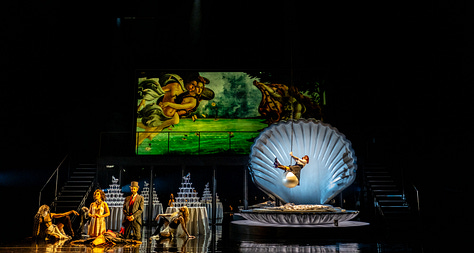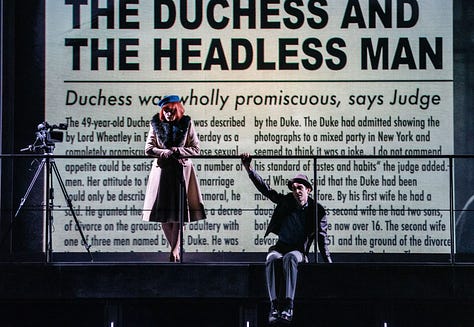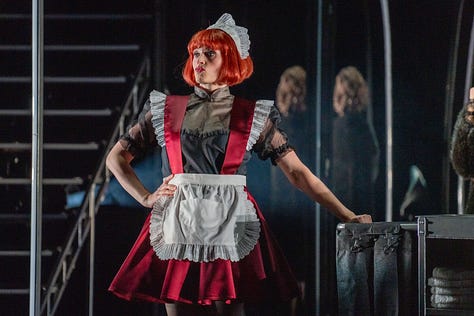Opera by Thomas Adès Production of Nederlandse Reisopera, 2024 Director: Paul Carr Conductor: Otto Tausk Cast: Laura Bohn (Duchess), Alison Scherzer (Maid), John Savournin (Hotel Manager), Daniel Arnaldos (Electrician)






This recent project at Nederlandse Reisopera is the fourth production of Powder Her Face that I have been involved in, and also now the fourth time I have written about experiences and themes within the opera on Substack (for reference: On Expressive Singing, On Embracing Complexity, and On Jumping In). Although it had not been the first thing that came to mind as a young singer fantasizing about what an opera career would look like, Powder Her Face is still one of my favorite pieces of music, and has always been for me a professional good luck charm.
One of the aspects of performing that I value the most is in the quality of the collaborative experience among colleagues. This incarnation of Powder Her Face at the Nederlandse Reisopera was very special for me, in that everything one could wish for in a creative endeavor was present. The camaraderie and collaborative effort between cast, crew and creative team were exceptional. It was equally enriching from a musical and interpretive standpoint, and the audiences in Holland were thoughtful and generous.
(above: rehearsal footage of our final balance call before the performance in Amsterdam.)
Although the experience was a collaborative paradise, Powder Her Face, like other serious pieces, can be emotionally draining due to the subject matter and tone of the opera. So to achieve a certain level of artistic and interpretive excellence, without carrying home with you afterwards so much of the weight of it, is testament not only to the quality of the conditions NLRO provides their artists, but also to the necessity of professional cooperation during the whole process.
I think there is a paradox of familiarity when it comes to performing works several times over the course of one’s career. Repetition can either give an artist the freedom to further explore different complexities of a character, or the kind of overconfidence that can limit interpretive depth when performers go on autopilot, out of the assumption of “knowing better”. I know I am taking several of my musical peers to task when I say that it is no wonder critics complain about lack of presence and charisma from singers, if the running industry joke is an admission that they are often thinking about their grocery list as they perform.
(above: a mini-documentary of the production tour by NPO Klassiek)
Aside from how one’s opinion or experience of music can change according to how a production is organized, interpreted and executed, I think it is interesting as you live your life, to see how your understanding of a role or an opera evolves as you do. In the first production I was involved in, I saw the opera as a commentary on social mobbing and celebrity. Now only a few years later, with our final performance in Amsterdam having taken place two days before turning 40, all that I am contemplating from the nostalgia of such a positive experience, is the ephemerality of life and work and music. Proof that we see things as we are, I guess!
With this in mind, one of the more prominent themes in Powder Her Face is of mortality and the obsession with reliving the past. Probably my favorite line in the opera is from the Maid in reference to the Duchess’s perfume, about which she says “It’s called Joy, and in the end, it evaporates into air, like everything.” Maid was a role I felt I had already known very well, and yet delivering that line more recently, its meaning has expanded for me, from referring to a metaphorical disintegration of the Duchess’s wealth and vitality, to a figure of speech that can be applied universally to the impermanence of life.
I remember at one point on tour, admitting to my young bass colleague, that I was slightly jealous that he could live with the role in his repertoire for at least the next twenty years of his career if he wanted to. I had been thinking about where Powder Her Face sits in the timeline of my repertoire. Unfortunately, for many female singers, the question of when “enough is enough” with a role, applies not only to how the music sits in your voice as you age, but also to whether a character’s identifying features are still compatible with your own. That is a very diplomatically articulated statement— to be honest, at least in this case, my exact thought was “How much longer do I have the sex appeal to pull this off?!”
(above: backstage view of the dress rehearsal)
Beyond the question of whether women can or should portray younger female archetypes on stage as they age (also diplomatically put), I am wondering whether there is also a moral responsibility of performing artists to consider when it is time to let a role go, regardless of our capacity to perform it musically. Should we ask ourselves at some point, whether we have lived out the full potential and limits of how a character can be interpreted by ourselves? Furthermore, if a specific production is a career highlight, is it possible going forward, to rediscover and explore other nuances within the piece? Or are we risking committing an injustice, if the subconscious need or pressure is to recreate an experience that was only meant to be lived out and appreciated in the time that it had taken place?
Throughout these posts on the subject of Powder Her Face, I have commented several times on the fact that I had really struggled to empathize with a character such as the Duchess of Argyll. Yet here I am, intellectually drowning in my own sentimentality about the lifespan of my involvement in performing this opera, as she had reminisced about her youth in the eighth scene of the opera! While I cannot say for sure whether this production of Powder Her Face will or should be my last, I think this essay is probably an appropriate closing to whatever editorial contribution I can make towards celebrating how significant this piece has been for my personal and professional life over the last several years.
“The singers sing and act with dedication: mezzo Laura Bohn as the Duchess and Alison Scherzer with her effortless stratospheric coloratura, the supple tenor of Daniel Arnaldos, the concentrated bass of John Savournin in all the other roles: together they form an ideal ensemble, organically complimented by the strange trio of dancers Nicky van Cleef, Ivan Montis and Davide Troiani. The result is a delightful evening of opera.”
Javier López Piñón, Theaterkrant
We all have a fantasy of arriving at a conflict-free plateau, or a sunlit glen without struggle, without the demand for increasing consciousness, without being pulled deeper and further than we wish to travel. Interestingly, there is such a place— it is called death.
— James Hollis
Recommended listening:




